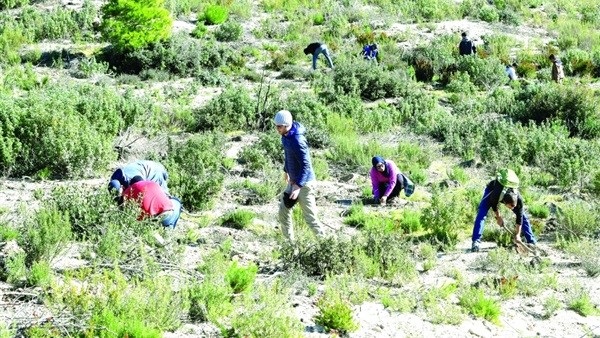Terrorist mines besiege farmers and herders in Tunisian mountains

Tunisia is among the countries in which armed terrorist
groups have used primitive anti-personnel and armored mines on a large scale,
and their effect has been evident for more than a decade in the killing of
dozens of military personnel and civilians during combing operations in planted
areas in the highlands or during grazing activities, and it has also caused the
deaths of herds of cattle.
Families living near mine-laden areas in Tunisia paid a
heavy price in the fight against terrorism due to the interruption of their
economic activities as a result of the mines and
the loss of their lives, in addition to the permanent physical disabilities of
those injured.
Since 2012, the Tunisian border with Algeria has been
witnessing clashes between the Tunisian army and extremist groups, as the
residents of the Tunisian governorate of Kasserine suffer from the consequences
of those confrontations, and the mountains surrounding the region remain
vulnerable to the dangers of hand-made mines. The residents often risk their
lives climbing those mountains because agriculture represents their only means
of subsistence, while the armed militants disembarked to secluded dwellings,
instilling fear in the hearts of the inhabitants.
Adnan public incident
Perhaps the latest of the incidents that struck the
residents of the Jebel Mghilla region was the incident of the young high school
student Adnan Al-Amoumi and his escape from death after a mine exploded in his
hand and face while he was collecting “wreath plants” in the forest located on
the Algerian-Tunisian border with the aim of selling them and providing the
money needed for his studies, which led to the loss of one of his eyes and an
injury to his right hand.
The story of this student attracted Tunisian public opinion
and political decision-makers, as the authorities ordered his transfer from the
Kasserine Governorate Hospital (300 km southwest of
Tunis) to the central military hospital in the capital.
A statistical report issued in 2021 by the UN-supported Landmine
Monitor indicated that civilians still represent the main victims of weapons,
accounting for eight out of 10 victims, with children making up no less than
half of those killed or maimed.
Landmine Monitor said that at least 60 countries, including
Tunisia, are contaminated with terrorists' anti-personnel mines.
Perhaps the most prominent incident of a mine killing
civilians was the incident of Khadija al-Rahimi, who lost her leg to a mine in
Jebel Salloum on the outskirts of Kasserine in 2018 while collecting firewood.
Fortunately, her youngest daughter, who was with her, was not injured in the
explosion, but her cousin sustained eye damage in the incident.
Living with mines
Like the family of Khadija Al-Rahimi, the defenseless
residents of the villages bordering the mountains were forced to live for years
with the danger of armed men lurking in the highlands, which turned into a
deadly trap for civilians or soldiers.
The bloodiest assault was what the siblings Mabrouk (16
years old) and Khalifa Al-Sultani (21 years old) were subjected to, when the
two were slaughtered and beheaded in the same area in Jebel Mghilla, between
the governorates of Kasserine and Sidi Bouzid, in two separate incidents in
2015 and 2017, respectively.
Although the security forces have liquidated most of the
militants in those areas, and their activities and attacks have receded, the
number of mines they left behind to disrupt tracking operations is still unknown.
According to Tunisian judicial and security circles, most of
those involved in terrorist operations, planting mines and using firearms have
ties to terrorist organizations and old extremist armed groups that spread two
decades ago in Algeria and the African Sahel and Sahara countries.
After 2011, the influence of these organizations increased
in Libya, Tunisia and the mountains of eastern Algeria, in particular Al-Qaeda
in the Islamic Maghreb (AQIM), Soldiers of the Caliphate, Uqba bin Nafaa
Brigade and Ansar Assad bin Al-Furat, all the way to ISIS.
Tunisian President Kais Saied devoted paragraphs of his
recent speeches to warning against terrorism and the dangers of indications of
successive terrorist operations and cases of mines exploding in the forests and
rugged mountains in the western governorates of the country. He also tasked new
Prime Minister Ahmed Hachani, while assuming his duties, to take care of the
phenomenon of terrorism and the strategy to combat it on the security,
economic, social and political levels.





